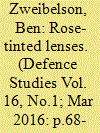|
|
|
Sort Order |
|
|
|
Items / Page
|
|
|
|
|
|
|
| Srl | Item |
| 1 |
ID:
143610


|
|
|
|
|
| Summary/Abstract |
Decision-making in defense acquisition programs in the Republic of Korea (ROK) has been problematic, especially in highly advanced complex systems. The highly disputed force modernization program for the ROK Air Force’s fifth-generation fighter, dubbed the Fighter eXperiment, went through extreme turbulence during the type selection phase. The gist of the turbulence became evident through poor institutional coordination within the defense acquisition authorities that eventually forced them to rescind the decision generated from their own yearlong efforts, thus basically shooting themselves on the foot. The paper highlights the background of the program and reviews the institutional elements that influenced the decision-making process, and conclude that the absence of an effective coordination mechanism has made decision-making in complex defense programs even more troublesome.
|
|
|
|
|
|
|
|
|
|
|
|
|
|
|
|
| 2 |
ID:
143609


|
|
|
|
|
| Summary/Abstract |
Military transformation is a complex, slow, asymmetric, changeable, political, and not necessarily completely rational process that clearly needs an effective monitoring mechanism. This paper fills a gap in current literature by creating and testing a model for multi-dimensional and multi-level quantitative monitoring of military transformation applicable in any country. The model is based on 10 transformation indicators that reflect changes in organizational structure, personnel structure, weapon systems, and defense spending. Its application on a sample of seven countries (USA, United Kingdom, France, Netherlands, Poland, Russia, and China) in the period from 1992 to 2010 unexpectedly shows that the USA – a protagonist in the transformation process among allies as well as globally – has carried out the smallest relative change. The non-directed transformation index indicates that Russia carried out 51.8% more change (or 34.1 index units), and the directed index indicates that Poland carried out 157.2% (or 40.8 index units) more change than the USA.
|
|
|
|
|
|
|
|
|
|
|
|
|
|
|
|
| 3 |
ID:
143611


|
|
|
|
|
| Summary/Abstract |
Strategists and military professionals have previously questioned many of the methodological (theoretical underpinnings, the principles, and rules applied by the discipline) decisions associated with American military strategy, but the direction this essay takes is above and beyond the common methodological rivalries in how we pursue strategic desired future states. To get beyond methodological disputes entirely, we must consider thinking about our thinking as an organization on American strategy. Thus, this article hovers between philosophies, organizational theory, as well as our usually unquestioned belief in something called “strategy”. Questioning things about our basic understanding of the world tends to trigger strong organizational defense mechanisms, for good reason. Critical reflection at deep levels puts our worldview, and our role within it at stake. Nonetheless, as strategic disappointment emerges over multiple complex conflict developments, even the most cherished and guarded choices on how the world ought to work are ripe for critical inquiry. This essay examines the limited single strategic paradigm of the US defense industry and how the latest American National Security Strategy and Army Future Operating Concept (Win in a Complex World through 2030) presents a flawed strategic position. This essay presents valid alternative strategies that operate within different paradigmatic constructs.
|
|
|
|
|
|
|
|
|
|
|
|
|
|
|
|
| 4 |
ID:
143608


|
|
|
|
|
| Summary/Abstract |
The article analyses the Spanish military transformation. This process started in 2004 as a means to adapt the force structure, organization and capabilities of the Spanish military to meet present and future threats in compliance with NATO’s initiatives, thus ensuring the continuity of the equipment modernization, professionalization and the adjustment of the country’s defence architecture to the post-cold war environment. A decade later, although transformation is still a priority for the Ministry of Defence, limited political will, a lack of strategic guidance, poor resource management and the effects of the economic crisis are compromising its development. This article describes the Spanish military transformation and assesses its value in adapting the country’s armed forces to the current and prospective security environment.
|
|
|
|
|
|
|
|
|
|
|
|
|
|
|
|
|
|
|
|
|